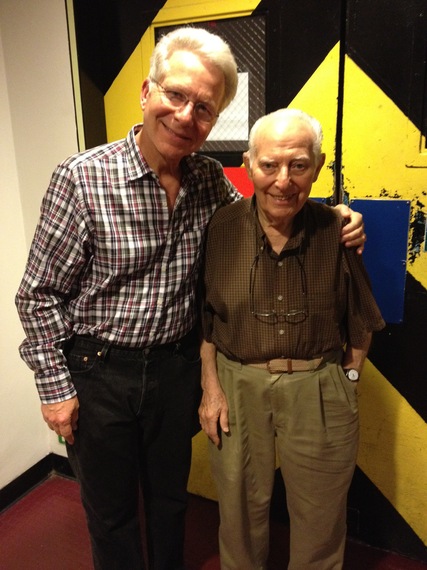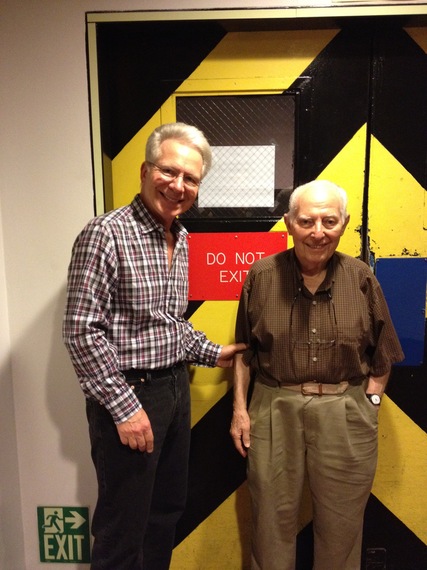Today we learned of the death of Dick Horowitz at the age of 91. You perhaps never heard of him. If you went to the Metropolitan Opera or listened to its broadcasts any time from 1946 until two years ago, you definitely heard Dick Horowitz. He played percussion and was the opera house's principal timpanist.
I first met him in 1972 when I assisted Leonard Bernstein for a new Met production of Carmen that starred Marilyn Horne and James McCracken. He was my timpanist for 11 performances of Fidelio in the 1976-77 season, starring Gwyneth Jones and Jess Thomas, as well as for a series of performances of Gounod's Roméo et Juliette for the Met's last national tour a few years later. He was one of my inadvertent angels.
I last saw Dick on September 2, 2012. He and his grandson David were cleaning out his Met cupboard of percussion instruments. Dick had retired after some 10,000 performances and he was taking all his "toys," as percussionists call their instruments, home to Manhasset. I had come to pick up six batons that Dick had made for me. Each of them says "30 Aug 12 JM" and just below, they are signed perfectly and minutely "R. Horowitz." They are now priceless.
During the summer of 1971, I was a conducting fellow at the Berkshire Music Festival (Tanglewood). That's when I met Leonard Bernstein. He was there for just one week (to conduct Beethoven's Missa Solemnis). Normally, Bernstein would stay at Tanglewood for two weeks, but that summer was different. He was completing his two-hour-long Mass for the opening of the Kennedy Center. (He referred to the Beethoven work as "this other guy's Mass.") At that time, he was using batons made by various people, most probably Saul Goodman, the New York Philharmonic's timpanist (from 1926 until 1972).
One year later, while Bernstein was rehearsing at the Met for the New York premiere of Mass, he broke his Goodman baton. "Saul was making them out of maple," Dick told me. "He got it all wrong. Maple is hard and snaps." An emergency call went out from C-level (in the bowels of the Met) and Dick, who had first met Lenny at Tanglewood in 1941 -- and who was in the house that fateful day -- provided one of his batons made out of birch. Lenny never went back to Goodman and his maple sticks. Dick provided Bernstein with batons until the maestro's death in 1990 -- and, I should say, batons for me, too.
All of us who watched the magic of Bernstein (and you can watch him on YouTube and on hundreds of hours of videos) will see Dick's brilliant improvement on an ancient instrument -- the instrument that makes no sound but that extends the reach of the conductor, clarifies the intention of the beat, and saves our arms from early retirement due to repetitive stress. The ideal baton must also rest in the hand, perfectly balanced, without any need to grab it, unless for effect. The "hand end" is cork. (Goodman ultimately gave Dick all his corks when he finally retired, and once they were used up, Dick got his corks from Portugal) It must rest safely in the palm of one's right hand so the baton does not slip out.
In his studio on Long Island, Dick Horowitz used a lathe and carved the perfect cork handle and inserted the birch stick, which he had shaped to a gentle point, painted it with a thin shellac, and then signed and dated the finished masterpiece.
I turned 27 shortly after Bernstein's 54th birthday that late summer of 1972 and I gently asked Dick if he would make me a baton -- not any baton, but one that was exactly made to the specifications used for my new mentor, Leonard Bernstein. Perhaps this was a mistake since Lenny was a good deal shorter than I am, but I did not care -- and still do not care -- because this apprentice wanted his sorcerer's wand. And wouldn't you?
When we last saw each other on that September afternoon in 2012, we stood in the vestibule behind the stage door of the Met. It was between seasons. There was just a security guard, his grandson, and me in a silent opera house that was both empty and dark. Something in me knew this was a precious moment. Time had stopped and here was perhaps one last opportunity to ask him some questions.
Dick was enormously generous with both his time and his knowledge. When I conducted my first Elektra at the Pittsburgh Opera, I asked him about the notoriously complicated timpani part. Dick, who had been trained at G. Schirmer as a copyist, rewrote all his timpani parts in an impeccable handwriting, indicating all the tunings and cues from other instruments to help him play in the right pace -- even after long periods of rest. "I never depended on a conductor to cue me," he said. I don't blame him. If you did cue him, he was looking at you. If you were too busy with other matters, he came in anyway.
And he provided me with a copy of his part to Elektra to share with my timpanist in Pittsburgh. That was Dick Horowitz.
Something from my childhood suddenly came to my mind that afternoon in 2012. I have no idea why this popped into my head, but I said to him, "Dick, were you by any chance playing that night in the old house -- it was a Friday night in the 1960s -- when Solti was conducting Tristan with Birgit, and at the top of the prelude, something fell on the timpani making an enormous boom?" [In case you do not know the prelude, it starts with just the cello section playing pianissimo. The timpani do not come in for eight minutes, and when they do, it is practically inaudibly quiet.]
Dick's face lit up. "Was I there? I was sitting at my timpani when it happened!"
"That was you?," I said with a laugh.
"NO! I didn't play it. Everyone in the orchestra thought the head on one of my drums had exploded. Solti later said, 'I thought I was shot!' but I just sat there waiting for my entrance and knowing I could not investigate until the first intermission [which is over an hour after the opera begins]."
The answer was a tale of the mother of a cast member who got a free ticket to the uppermost balcony and who had put her coat over the railing. A large button had fallen off and landed directly on one of Dick's timpani heads. Ka-BOOM! (I remember seeing something fall from above as I zeroed in on Solti with my opera glasses.)
OK, maybe that isn't the most interesting story you ever heard, but at that moment in a darkened corridor of a ghostly Metropolitan Opera, I had what felt like a cosmic reunion in which the half-forgotten memories of a teenaged boy, seeing Tristan for the very first time, were being shared more than a half century later with someone who had played that performance ... and we were friends across time, sharing stories from two opposite vantage points -- the audience and the performer.
I hugged him and David took a few photos of us.
I just checked. I have 13 Dick Horowitz batons. I am 70 years old. The birch doesn't snap. I think I am OK, especially knowing that Lenny and Dick will come with me wherever I go and help me make music.
They are both, after all, in the palm of my hand.


